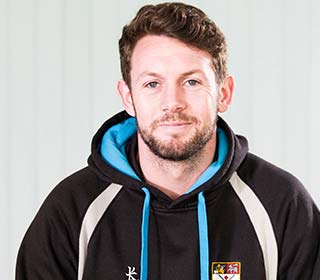
BSc (Hons) Football Science
Start your future in football here. Develop the skills you need for a career in football focusing on player development and team performance. This specialised course offers expert teaching, training in practical skills, built-in industry qualifications and an optional one year work placement.

Entry requirements
Three A-levels at grades BBC or above
BTEC DMM or above
Or Access 30-42 D/M with min 18D
Or T level M
And GCSE English Language at grade 4 or grade C or above
Applicants with other qualifications and/or experience will be considered on an individual basis
We will accept 2 AS levels in lieu of one A level but must be accompanied by 2 A Levels or BTECs (General Studies is excluded).
UCAS points 112
UCAS code FBS1 without placement year or FBS2 with placement year
UCAS institution code P63
Duration Three years full-time or four years full-time with the optional professional practice year, or up to six years part-time
Any questions?
Contact Tara Godber, our Applicant Support Coordinator, if you have any questions. Email applicantsupport@marjon.ac.uk and Tara will get back to you.
Course Summary
BSc Football Science has been developed in collaboration with football industry professionals. It offers an outstanding quality of education alongside the skills and expertise required to work in football.
You'll learn to support individual player development and team performance. Embedded in the course are industry recognised qualifications from an array of professional bodies. It provides industry recognised qualifications at no extra cost. These include FA Level 1 and Level 2 in Coaching Football, Catapult Athlete Tracking Level 1 and Level 2, Level 2 Gym instructor and Level 3 Personal Trainer. These enable you to develop specific, vocational and academic skills that are necessary to embark on a career in the football industry.
You will be encouraged to undertake work-based learning with our network of football industry partners including Plymouth Argyle FC and the FA Women’s High Performance Football Centre right here on our campus.
BSc Football Science degree teaches you to apply scientific principles to all aspects of athletic development across the age appropriate phases of player development. There is a strong emphasis on practical learning and how to apply these scientific principles to player or team performance.
It is taught by highly qualified academics and industry professionals who are employed in the football sector, enabling students to benefit from their knowledge and experience.
You will gain practical knowledge and understanding across the sport science disciplines in our world class sport science lab. Ours is the only lab in the South West to be accredited by the British Association of Sport & Exercise Science (BASES). It draws elite athletes from across the region and students get valuable experiences from working with them.
BSc Football Science includes an optional professional practice year. You have the opportunity to gain industry specific skills by working within football for a year. It increases your knowledge of the sector, provides relevant work experience and develops your personal network in the football industry. The professional practice year is available after your second year and you then return to university for the final year of teaching.

Why this course at Marjon?
State of the art sport and exercise science lab - accredited by BASES
Gain key football industry qualifications (at no extra cost)
Field trips to see football science in practice within high performance settings
Develop your knowledge and practical skills at the FA Women’s High Performance Football Centre
Learn with our professional football partners
Practical hands-on experience working with players as part of a multi-disciplinary team
Modules for this course
1st Year
Introduction to football science
Introduction to performance and movement analysis in football
Conditioning principles for sport, exercise and health
Football science: the foundation stage
Anatomy and physiology for sport and exercise
Psychological concepts for football science
2nd Year
Research methods and analysis in sport and health science
Work-based learning
Analysing technique and performance for football
Nutrition for player recovery and football performance
Physical performance: testing, monitoring and evaluation for football
Football science: youth development phase
3rd Year
Honours project
Advanced performance analysis for football: a multidisciplinary approach
Talent identification in football
Football science: the professional development stage
Applied interdisciplinary football science
This course is perfect if you’re curious about
How does a performance analyst support technical and physical performance coaches?
What scientific principles influence talent identification and player development in football?
How does football science supports the FA England DNA and the FA four corner model?
What are the key physical, psychological and sociological differences between men and women footballers?
How does biological maturity impact on player development?
How can I support players and coaches to improving performance or reduce injury risk?
What might you become?
BSc (Hons) Football Science will prepare students for graduate careers by gaining transferable skills that employers require. Career opportunities include physical performance coach, performance analysist, sport scientist, talent identification and recruitment in a range of professional football environments.
Employment prospects in the football industry offer graduates to work within a variety of different professional environments. Some employment opportunities will be age range specific, whereby you will work as part of a multidisciplinary team or department. Graduates from this degree can also progress to postgraduate study.
See where our graduates are now
Working with:

FA Women's High-Performance Football Centre (WHPFC)
Work with some of the South West's best coaches and players. The WHPFC offers regional support for grassroots coaches in the women's and girl’s game to inspire player development.

Plymouth Arygle Football Club (PAFC)
Plymouth Argyle are an English League One football club. We work with both the men's and women's squads at our Sport & Health Centre on campus.
How you’ll be taught and assessed?
How will you be taught?
Teaching includes a combination of lectures, seminars, workshops, tutorials and practical experience within our high specification sport science laboratories. Work placements will also be undertaken.
How will you be assessed?
Assessments take place through lab reports, practical assessments, essays, case studies, e-portfolio and by creating your own website.

Chris has over 20 years experience as a football practitioner and has worked supporting players in a variety of football contexts from grassroots to elite. He has worked with The Football Association (FA), Plymouth Argyle FC, Plymouth Argyle Women's FC and is closely involved with the FA Women’s High Performance Football Centre.
Fees and funding
Fees UK students: £9,535 per annum
Fees for International students: £14,600 per annum
This fee covers your tuition and access to course-specific equipment and facilities, as well associated services including access to the library, study skills support, IT support, student support and wellbeing services and membership of the Student Union. There may be additional costs by course.
Additional costs:
You'll need to cover the following additional costs:
- A DBS check is required
- You'll need a Marjon sports kit
- Some students opt to fund related qualifications or student memberships of external organisations
Funding available for this course
Our Student Funding Advisors offer confidential and impartial advice about your funding options.
Learn moreLecturers

Ben, currently undertaking a PhD specializing in vertical jump force-time analysis; monitoring and enhancing performance. He is also a Sport Science Officer lecturing in applied biomechanics and strength & conditioning.

Melissa has research interests that include increasing self-awareness and positive growth and mental health, developing confidence and emotional control, reducing anxiety, and facilitating communication.

Sophie, who plays pool for England, teaches sport and exercise psychology principles and how these can be applied to improve sport performance and wellbeing.

Ben has more than 20 years experience working in various health and fitness roles. In this time he has worked with more than a thousand participants and helped train hundreds of fitness professionals.

Dr Joseph Layden
Associate Dean (Research and Innovation) School of Sport, Business and Media
View profileJoe has 20 years experience within the area of health and exercise physiology and researches health care interventions, physiology and metabolism. He previously worked as an Occupational Physiologist and Researcher for the UK Ministry of Defence and the Netherlands National Research Office.

Chris is Manager of the Sport and Health Science Laboratory.
Find out more about studying BSc (Hons) Football Science at Marjon





